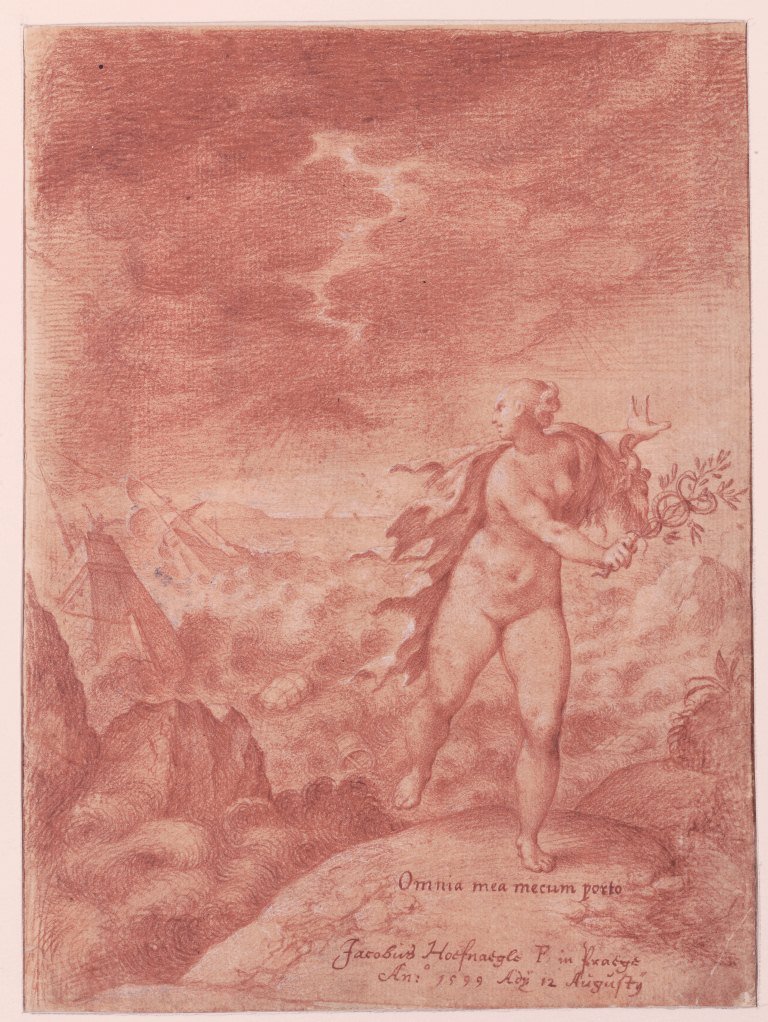Omnia Mea Mecum Porto on:
[Wikipedia]
[Google]
[Amazon]
 ''Omnia mea mecum porto'' (
''Omnia mea mecum porto'' (
''Epistulae morales'' 1,9,19
an
''de constantia sapientis'' 5,6
to
 ''Omnia mea mecum porto'' (
''Omnia mea mecum porto'' (Latin
Latin (, or , ) is a classical language belonging to the Italic branch of the Indo-European languages. Latin was originally a dialect spoken in the lower Tiber area (then known as Latium) around present-day Rome, but through the power of the ...
: "All that is mine I carry with me") is a quote that Cicero
Marcus Tullius Cicero ( ; ; 3 January 106 BC – 7 December 43 BC) was a Roman statesman, lawyer, scholar, philosopher, and academic skeptic, who tried to uphold optimate principles during the political crises that led to the estab ...
ascribes to Bias of Priene
Bias (; Greek: Βίας ὁ Πριηνεύς; fl. 6th century BC) of Priene was a Greek sage. He is widely accepted as one of the Seven Sages of Greece and was renowned for his probity.
Life
Bias was born at Priene (modern-day Güllübahçe, Tur ...
. Bias of Priene, one of the Seven Sages of Greece
The Seven Sages (of Greece) or Seven Wise Men (Greek: ''hoi hepta sophoi'') was the title given by classical Greek tradition to seven philosophers, statesmen, and law-givers of the 7–6th century BC who were renowned for their wisdom.
The S ...
, is said to make the statement during the flight from his hometown, with the apparent meaning that his possessions are those of character traits and wisdom (as opposed to material things).
Later, in a letter to Lucilius and the treatise ''De constantia,'' Seneca the Younger
Lucius Annaeus Seneca the Younger (; 65 AD), usually known mononymously as Seneca, was a Stoic philosopher of Ancient Rome, a statesman, dramatist, and, in one work, satirist, from the post-Augustan age of Latin literature.
Seneca was born in ...
attributed the variant ''Omnia mea mecum sunt'' (Latin
Latin (, or , ) is a classical language belonging to the Italic branch of the Indo-European languages. Latin was originally a dialect spoken in the lower Tiber area (then known as Latium) around present-day Rome, but through the power of the ...
: "All that is mine is with me")Seneca''Epistulae morales'' 1,9,19
an
''de constantia sapientis'' 5,6
to
Stilpo
Stilpo (or Stilpon; el, Στίλπων, gen.: Στίλπωνος; c. 360 – c. 280 BC) was a Greek philosopher of the Megarian school. He was a contemporary of Theophrastus, Diodorus Cronus, and Crates of Thebes. None of his writings survive, b ...
after the destruction of Megara
Megara (; el, Μέγαρα, ) is a historic town and a municipality in West Attica, Greece. It lies in the northern section of the Isthmus of Corinth opposite the island of Salamis Island, Salamis, which belonged to Megara in archaic times, befo ...
by Demetrius I of Macedon
Demetrius I (; grc, Δημήτριος; 337–283 BC), also called Poliorcetes (; el, Πολιορκητής, "The Besieger"), was a Macedonian nobleman, military leader, and king of Macedon (294–288 BC). He belonged to the Antigonid dynast ...
.
See also
*List of Latin phrases
__NOTOC__
This is a list of Wikipedia articles of Latin phrases and their translation into English.
''To view all phrases on a single, lengthy document, see: List of Latin phrases (full)''
The list also is divided alphabetically into twenty page ...
References